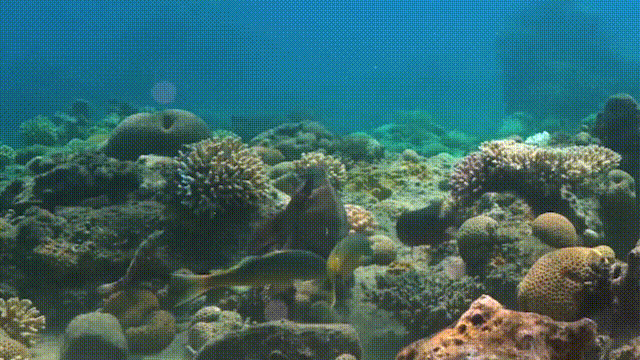If you had to pick which creature is the schoolyard bully under the waves you probably wouldn’t have gone with the octopus.
But it turns out the cephalopods will lash out and punch fish for seemingly no reason other than spitefulness.
This has been captured on film and analysed by scientists in a new paper for the scientific journal Ecology.
They say that this thuggish behaviour – which they call the ‘active displacement’ happens while octopuses team up with fish to hunt together. When things are getting a bit hectic, the octopuses will lash out at the fish to keep them away from the grub. It’s a bit like shoving someone else out of line at the queue for the buffet.
‘Octopuses and fishes are known to hunt together, taking advantage of the other’s morphology and hunting strategy,’ explained marine biologist Eduardo Sampaio from the University of Lisbon in Portugal.
‘Since multiple partners join, this creates a complex network where investment and pay-off can be unbalanced, giving rise to partner control mechanisms.’
Octopuses punch fishes. YES. OCTOPUSES. PUNCH. FISHES!!
— Eduardo Sampaio (@OctoEduardo) December 18, 2020
Our new paper is out on @ESAEcology, showing that octos express this behavior during collaborative hunting with other fishes. This was probably the most fun I had writing a paper. Ever! (small ð§µ)https://t.co/Vwg9BoaSUo pic.twitter.com/PIYuVXpM9t
The scientists observed interactions between octopuses and a number of different species of fish in the Red Sea.
‘Multiple observations involving different octopuses in different locations suggest that punching serves a concrete purpose in interspecific interactions,’ the team wrote.
‘From an ecological perspective, actively punching a fish partner entails a small energetic cost for the actor (i.e. octopus), and simultaneously imposes a cost on the targeted fish partner.’
However, the scientists also witnessed occasions when the octopus would punch the fish for seemingly no reason.

There was no active hunt and the fish didn’t appear to be getting in the way of the octopus living its life. It just wanted to throw its weight around.
‘In these cases, two different theoretical scenarios are possible. In the first one, benefits are disregarded entirely by the octopus, and punching is a spiteful behaviour, used to impose a cost on the fish,’ the researchers write.
‘In the other theoretical scenario, punching may be a form of aggression with delayed benefits (i.e. direct negative reciprocity or punishment), where the octopus pays a small cost to impose a heavier one on the misbehaving partner, in an effort to promote collaborative behaviour in the following interactions.’
Either way, it’s probably best not to ever cut in front of an octopus at the lunch line.


